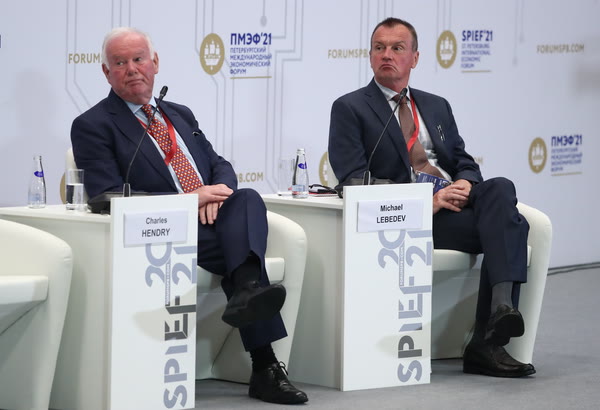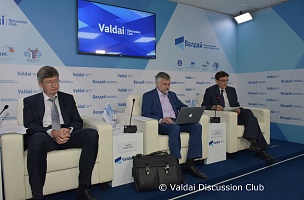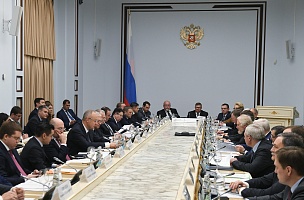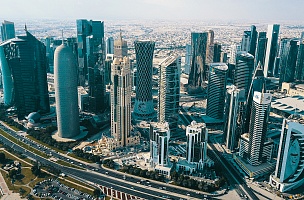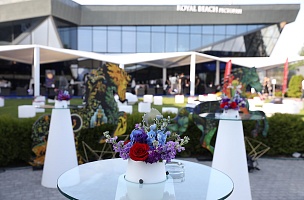KEY CONCLUSIONS
Creativity already dominates over the resource economy
“The direct answer to the question of how soon human capital will replace petroleum is that human capital replaced it long ago. The president talks about this, and members of the government constantly talk about it: it is not natural resources, not oil and gas that are important in Russia, but people – this is the most important capital in our country,” Sergey Novikov, Chief of the Presidential Directorate for Social Projects.
“I think that creativity is about overcoming borders, about the ability to think outside the box,” Teresa Iarocci Mavica, General Director, V–A–C Foundation.
“We need to understand and know what creativity is and how it works. <…> It is the foundation for the culture. Creativity is something worth dedicating yourself to, and this is a characteristic of a person and the culture of the community as a whole,” Stefan Klein, Physicist, Professor, Berlin University of the Arts.
“We are moving into a new era, an extraordinary time of innovation and invention. And over the course of the next few decades the way we travel, communicate, deliver healthcare, share ideas is going to change fundamentally,” Charles Hendry, President, Advisory Council, Russo-British Chamber of Commerce.
“There is a lot of creativity in neurosciences that are relatively new. First discoveries in neurosciences were made only at the beginning of the last century. But since that time, the rapid development of neurosciences began, and now is has gained pace, and we are learning more and more. Here I would like to talk about the creative area of neural interfaces. <...> Neural interface is an attempt to connect the human brain with some external device,” Michael Lebedev, Professor, Skoltech.
PROBLEMS
Humanity needs development strategies in the context of creative economy
“We are talking about the fourth industrial revolution. In the future, with the development of the machine learning, humans will compete more and more with the machines for their role in our world. What will differentiate us?” Jean-Claude Knebeler, Head of Sustainable Development Department, International and Comparative Law Research Center (ICLRC).
“In today’s world the creative economy is over 2 trillion dollars, it already creates more than 30 million jobs, this is not negligible. This is a large part of our economy. <…> We need to come up with strategies for the future so that our society develops,” Jean-Claude Knebeler, Head of Sustainable Development Department, International and Comparative Law Research Center (ICLRC).
“The challenge that we face is that politics pulls people apart, and our world is horribly divided. We are moving in the wrong direction. How do you build bridges between people? We need to find new ways of building these bridges,” Charles Hendry, President, Advisory Council, Russo-British Chamber of Commerce.
SOLUTIONS
Exchange of views and discussions for the implementation of creative ideas
“We do not need to be afraid to approach it and overcome the limitations,” Teresa Iarocci Mavica, General Director, V–A–C Foundation.
“As my colleagues have already said, this creativity cannot exist in islands, it has to be exchanged. There has to be a debate of ideas, playing games, and not only for children, but for adults – we also play games, we just do not know that we do. <…> And sharing ideas across borders is even more important,” Jean-Claude Knebeler, Head of Sustainable Development Department, International and Comparative Law Research Center (ICLRC).
“We have been thinking for a long time that creative processes take place in brains of gifted people. Creative ideas are only born in brilliant minds. But today we know that this is not so, creativity arises in human interaction. <…> There are three factors that contribute to this, for example, the amount of information and the number of people who live and breathe in this environment and exchange ideas. The more people get together, the more information they have at their disposal, the more unexpected, unusual ideas come to their minds,” Stefan Klein, Physicist, Professor, Berlin University of the Arts.
“We must ensure the most effective cooperation between the academic and scientific communities and the business. This knowledge needs to be shared so that all stakeholders can contribute. Since we have human capital that must be creative, we need to find ways to breakthroughs and overcome the crises we face,” Gu Ho Eom, Professor, Dean, Division of International Studies, Hanyang University.
Creative people need to be given more freedom
“By definition, law restricts and creates certain boundaries. But creativity goes beyond these boundaries. And it is a challenge for politicians to get away from regulation in order to give the society a platform for a safe play with ideas and dreams,” Stefan Klein, Physicist, Professor, Berlin University of the Arts.
“One of the things that I admire the most about Russia is the culture, science, technology. The accessibility of opera, ballet and concerts here – it is remarkable compared to so many other countries. You give people opportunities to collectively create a better world. <…> We need to unleash this potential, too much government interference and too many barriers will stifle it. As policymakers, we need to say: we are going to let the government create a framework, but then we are going to let the human genius in art and other fields deliver the solutions,” Charles Hendry, President, Advisory Council, Russo-British Chamber of Commerce.
For more information, visit the ROSCONGRESS.ORG Information and Analytical System.


